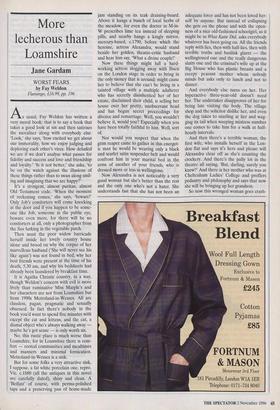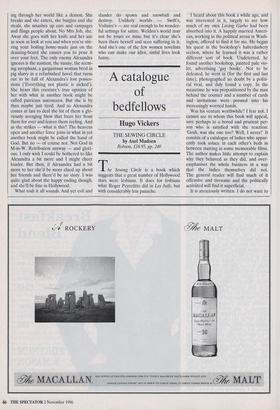More lecherous than Loamshire
Jane Gardam
WORST FEARS by Fay Weldon Flamingo, £16.99, pp. 196 As usual, Fay Weldon has written a very moral book; that is to say a book that takes a good look at sin and then satirises the moraliser along with everybody else. `Look,' she says, 'how excited we get about our immorality, how we enjoy judging and deploring each other's vices. How deluded we are if we don't analyse what passes for fidelity and success and love and friendship and loyalty.' Is it not better,' she asks, 'to be on the watch against the illusions of these things rather than to swan along smil- ing and imagining that we are happy?'
It's a stringent, almost puritan, almost Old Testament code. 'When the moment of reckoning comes,' she says, 'beware!' Only Job's comforters will come knocking at the door and if you happen to be some- one like Job, someone in the public eye, beware even more, for there will he no comforters at all, only a photographer from the Sun lurking in the vegetable patch.
Then must the poor widow barricade herself inside her lovely country house alone and brood on why the corpse of her marvellous husband (`She will never see his like again') was not found in bed, why her best friends were present at the time of his death, 5.30 am, and why his bedsheets had already been laundered by breakfast time.
It is Agatha Christie country, in a way, though Weldon's concern with evil is more lively than ruminative Miss Marple's and her characters are not from Loamshire but from 1990s Metroland-in-Wessex. All are classless, pagan, pragmatic and sexually obsessed. In fact there's nobody in the book you'd want to spend five minutes with except the cat and kittens, and the cat, a dismal object who's always walking away maybe he's got sense — is only worth six.
No, this rustic place is much worse than Loamshire, for in Loamshire there is com- fort — rooted communities and mealtimes and manners and minimal fornication. Metroland-in-Wessex is a sink.
But for some folks a very attractive sink, I suppose, a fat white porcelain one, repro. Vic. c.1880 (all the antiques in this novel are carefully dated), shiny and clean. A `Belfast' of course, with perma-polished taps and a preserving pan of home-made jam standing on its teak draining-board. Above it hangs a bunch of local herbs of the meadow, for even the doctor in M-in- W prescribes lime tea instead of sleeping pills, and nearby hangs a kingly mirror, mercury-based, c.1790, before which the heroine, actress Alexandra, would stand beside her golden, theatre-critic husband and hear him say, 'What a divine couple!'
Now these things might lull a hard- working actress slogging away with Ibsen on the London stage in order to bring in the only money that is around; might cause her to believe that she can't be living in a tainted village with a multiple adulterer who has secretly disinherited her of her estate, disclaimed their child, is selling her house over her pretty, unobservant head and has begun secret proceedings for divorce and remarriage. Well, you wouldn't believe it, would you? Especially when you have been totally faithful to him. Well, sort of.
Nor would you suspect that when the grim reaper came to gather in this energet- ic man he would be wearing only a black and scarlet satin suspender belt and would confront him in your marital bed in the arms of another of your friends, who is dressed more or less in wellingtons. Now Alexandra is not noticeably a very good woman but she's better than the rest and the only one who's not a hater. She understands fast that she has not been an adequate lover and has not been loved her- self by anyone. But instead of collapsing she gets on the phone and with the open- ness of a nice old-fashioned schoolgirl, as it might be in What Katie Did, asks everybody whatever has been going on. All the friends reply with lies, then with half-lies, then with terrible truths and basilisk glares — the wellingtoned one and the really dangerous slutty one and the criminal's wife up at the Big House who has plastic breasts and a creepy peasant mother whom nobody minds but asks only to lunch and not to dinner.
And everybody else turns on her. Her hyperactive three-year-old doesn't need her. The undertaker disapproves of her for being late visiting the body. The village shop and the solicitor dislike her, and even the dog takes to snarling at her and wag- ging its tail when weeping mistress number one comes to take him for a walk at half- hourly intervals.
And then there's a terrible woman, the first wife, who installs herself in the Lon- don flat and says it's hers and please will Alexandra clear off as she's counting the crockery. And there's the pally lot in the theatre all saying, 'But, darling, surely you knew?' And there is her mother who was at Cheltenham Ladies' College and proffers pedantry and philosophy and says that now she will be bringing up her grandson.
So now this wronged woman goes crash- ing through her world like a demon. She breaks and she enters, she burgles and she steals, she smashes up cars and rampages and flings people about. No Mrs Job, she. Away she goes with her knife and her axe as soon as look at you and when you're stir- ring your boiling home-made jam on the draining-board she causes you to pour it over your feet. The only enemy Alexandra ignores is the nastiest, the nanny, the seem- ing sycophant, a gargantuan woman bred in pig slurry in a refurbished hovel that turns out to be full of Alexandra's lost posses- sions (`Everything not plastic is nicked'). She hears this creature's true opinion of her with what in another book might be called patrician unconcern. But she is by then maybe just tired. And so Alexandra comes at last to deal the lot of them a glo- riously avenging blow that frees her from them for ever and leaves them reeling. And as she strikes — what is this? The heavens open and another force joins in what in yet another book might be called the hand of God. But no — of course not. Not God in M-in-W. Retribution anyway — and glori- ous. I only wish I could be bothered to like Alexandra a bit more and I might cheer louder. But then, if Alexandra had a bit more to her she'd be more clued up about her friends and there'd be no story. I was quite glad about the happy ending though, and she'll be fine in Hollywood.
What tosh it all sounds. And yet evil and slander do spawn and snowball and destroy. Unlikely worlds — Swift's, Voltaire's — are real enough to be wonder- ful settings for satire. Weldon's world may not be yours or mine but it's clear she's been there herself and seen suffering in it. And she's one of the few women novelists who can make our idiot, sinful lives look funny.



















































































 Previous page
Previous page